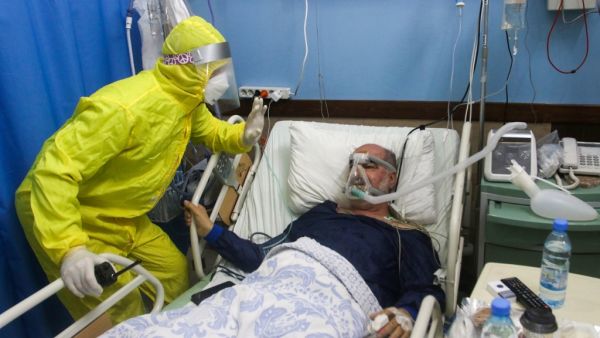Lebanon should be cautious in its efforts to close deals to secure any vaccines against COVID-19, in particular regarding the quality of the Chinese manufactured vaccines, health experts and academics have warned.
Last week, Dr. Abdul Rahman Bizri, head of the government’s emergency health committee, revealed to The Daily Star that the Health Ministry was keeping “all options open” for the country’s inoculation program against COVID-19, including the option of the vaccines developed in China.
While governments worldwide are negotiating to acquire more #COVID19 vaccines or accelerating the delivery of existing orders, #Lebanon only signed its first deal for 2.1 million doses of the Pfizer-BioNtech vaccine on Sunday.
— Al Arabiya English (@AlArabiya_Eng) January 20, 2021
Read more:https://t.co/EFH3NVp9sV
But Dr. Elias Rahal, associate professor of Immunology and Pathology at American University of Beirut, spoke to The Daily Star regarding the alarming discrepancies in the Chinese-developed vaccines’ efficacy rate in clinical trials and the lack of published data available for scrutiny from China.
The Asian country currently has two-leading manufacturers in the global vaccine market: state-owned Sinopharm and Beijing-based biopharmaceutical company Sinovac BioTech. Chinese authorities Wednesday said the country had administered 15 million jabs since it began the program last year.
Internationally, the Sinopharm vaccine has been authorized for use in countries such as the UAE, Bahrain, Egypt and Jordan. Back in December, the UAE and Bahrain declared the two-dose vaccine to have an efficacy rate of 86 percent in final-stage testing, clearing it for public use.
But concern arose from health officials as the results conflicted with the China’s own efficacy level of 79 percent, and added to criticism that its clinical trials are not performed to the same levels of transparency and scrutiny as its rivals in the US and Europe.
Inconsistent data also haunts China’s other jab produced by Sinovac, which in its most recent clinical trials in Brazil on Jan. 14 was shown to have an efficacy rate as low as 50.4 percent, just passing the 50 percent threshold needed for regulatory approval.
“There isn’t a good study out there that makes us trust these [vaccines],” Rahal admitted.
The Sinovac jab, known as CoronaVac, has been taken up in countries such as Turkey and Indonesia, where trials also gave differing efficacy results of 91.25 percent and 65.3 percent, respectively.
A hashtag calling for Lebanese people to get vaccines before refugees has sparked renewed debate in #Lebanon about racism, prejudice, and the right to medical carehttps://t.co/0yJ8yML94a
— The New Arab (@The_NewArab) January 20, 2021
However, it should be noted that trials are run differently in different countries, depending on the number of volunteers enrolled and the duration between the administered doses.
“One thing we should notice about this is that these vaccines have been tested in developing countries where governing bodies for conducting trials are not that rigorous, so this is a part of what makes me skeptical,” Rahal said.
Moreover, a closer look at Sinovac reveals that it has previously been tarnished by a bribery case between its CEO and officials in charge of vaccine reviews during the 2002 SARS virus outbreak and the swine flu pandemic of 2009, court records detail.
Rahal stressed that Lebanese health officials should take into account these factors, as well as the lack of available data on these jabs, before beginning to secure quantities for public use.
He noted that vaccine studies developed in the West, such as the Pfizer-BioNTech jab of which Lebanon has secured 2.1 million doses and the Oxford-AstraZeneca developed shot, have produced reliable and public reports to allow for a rigorous domestic approval process on the impact of the jabs.
Rahal explained that the effectiveness of the coronavirus vaccine is its ability to specifically produce neutralizing antibodies which ensure immunity from the disease. “The reports from Pfizer and Oxford have demonstrated you develop neutralizing antibodies.”
The now common antibody testing kits, which are a simple blood test to ascertain whether you have been exposed to COVID-19, could also be used after inoculation to check for antibodies. Yet they do not have the ability to determine the type of antibody to indicate complete immunity, Rahal detailed.
Furthermore, in Lebanon we do not have the lab conditions to test on a large scale for the crucial neutralizing antibodies, Rahal said, a fact the Health Ministry should be aware of in considering the country’s budding inoculation program.
“We should be cautious of getting just any type of vaccine, we need the neutralizing antibodies.”
Since the successful development of vaccines in the global fight against COVID-19, health officials have been warning that regulations like face masks and social distancing should not be relaxed, as the long-term immunity level remains unclear.
One health expert in Lebanon similarly told The Daily Star that he believed the low efficacy rate of China’s vaccines may not be a problem for the Chinese, where citizens are disciplined and will continue to observe safety measures. But he expressed wariness for Lebanon, as citizens here are more likely to regard vaccination as a “free pass” and risk foregoing social distancing and other measures.
This article has been adapted from its original source.








